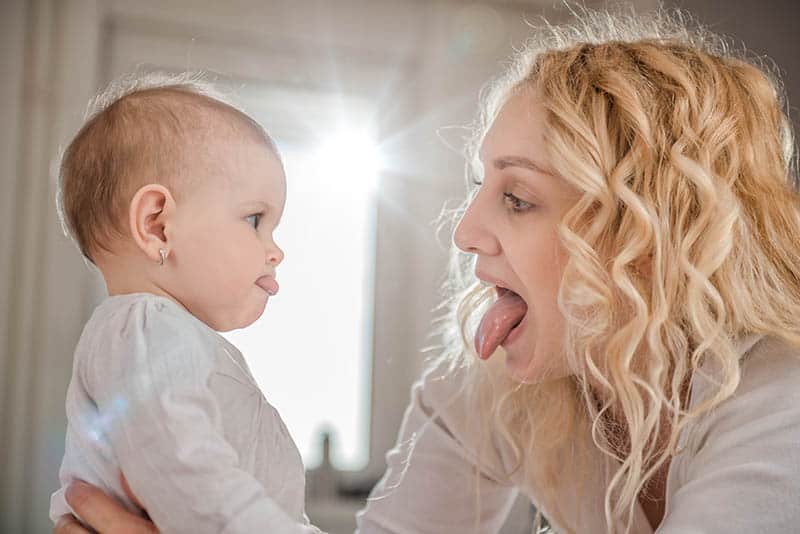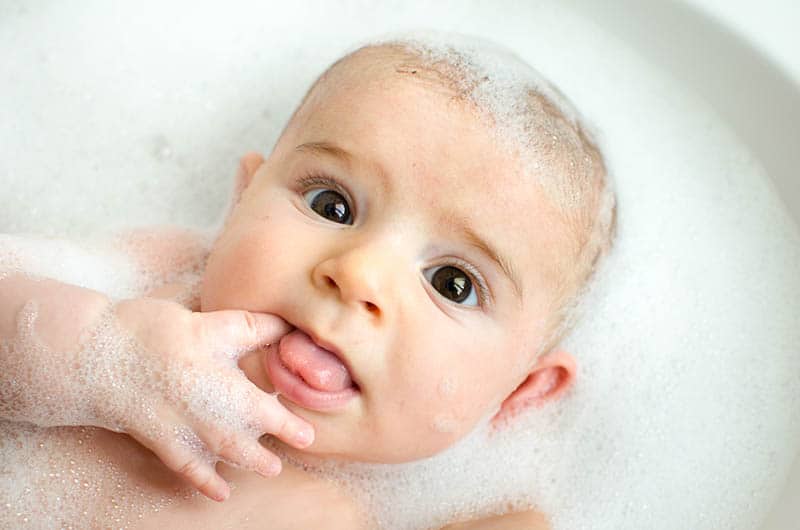Baby chewing tongue is one of many things our babies do that makes us moms wonder if everything is okay with our little angels.
While our instincts tell us that it’s probably just a normal thing babies do, we also start worrying that tongue chewing could be our baby’s way of telling us there’s something wrong.
There’s usually nothing wrong with a baby when they chew on their tongue, but it can be a cue for a particular need, depending on their age and development.
Let’s start off by answering the question that’s on the mind of every parent reading this article: Should I be worried?
Baby chewing tongue: Is there a reason to be worried?

There are so many things that our little ones do that scare us that are actually a completely normal part of their development.
Moms are prone to worrying over every little thing their babies do, wondering if it’s a sign of an underlying issue or maybe a habit developing that could hurt their little girls and boys.
Baby tongue chewing is one of those things.
Let me ease your mind right now by telling you that tongue chewing is something almost every baby does and it’s usually a perfectly natural part of their development.
Some moms worry that their baby might hurt themselves by chewing their tongue, but the truth is that babies instinctively stop doing something that causes them pain and chances are your baby is just lightly pressing on their tongue with their gums in a chewing motion or scratching it against their cutting teeth.
There are many different reasons that may cause your baby to start chewing their tongue and in this article I’ll tackle each one of them and offer you advice on how to reduce the tongue chewing to the very minimum.
Reasons for baby tongue chewing and things you can do to help reduce it:
0-3 MONTHS OF AGE:

1. Sucking reflex
The natural, sucking instinct is very strong in newborns and babies up to three months of age (and sometimes even later).
This natural urge to suck on things is rooted in their basic instinct for survival (sucking on nipples and bottles gives them food, for example).
When there’s no breast, bottle, or pacifier available, your baby might first try to put their fingers and hands in their mouth.
However, their lack of coordination means they often end up sucking on whatever is available – including of course, their tongue.
It’s not harmful, and your baby only does it to satisfy their need for sucking.
They might grow agitated as they do it, though, because sucking on their tongue doesn’t satisfy their need completely, or it may become uncomfortable for them.
What to do?
Simply make sure that you give your baby what they need, and that means something to suck on. When it’s not feeding time, offer your baby a pacifier.
The sucking reflex is connected to feeding, but babies also need “non-nutritive sucking” or comfort nursing, the kind of sucking that soothes them.
Don’t offer your baby any breastmilk or formula if you know they have just eaten and have a full tummy – simply recognize their need for soothing sucking.
2. Hunger cue

Some babies will try to suck or chew on their tongue when they are hungry (which is exactly what my baby did), even though most other babies actually stick their tongue out as a hunger cue.
The way to know if your baby chewing tongue is actually a hunger cue is to follow the other signs they’ll show if they’re hungry, such as:
– trying to bring their hands to their face
– opening their mouth
– rooting (moving their head left and right looking for a breast or bottle)
– flexing legs or arms faster than when they’re calm and satisfied
– fussing
– breathing faster, like they are excited
– making ‘mmm’ and sucking sounds
– ultimately, crying
What to do?
Babies this age usually get hungry every 2-3 hours, so make sure you keep track of the time between feeds.
Pay attention to your little one’s early signs of hunger.
Once they start crying they’ve already felt hungry for a while and might be feeling a pain like sensation that’s very uncomfortable for them.
Even though you might think that the hungrier your baby is the easier it will be to feed them, it’s actually the other way around.
It’s best to feed your baby while they’re still calm, especially if you’re having any kind of feeding issues with your little one.
So, if your baby starts doing their tongue chewing thing, accompanied by other early signs of hunger, it’s best to offer them breastmilk or formula.
If your baby has just finished eating and is still tongue chewing, try to offer them just a bit more food to make sure their belly is completely full.
3. They discovered they have a tongue

Your baby has just been born to this world and everything that’s normal for us is completely new to them, always keep that in mind.
So, in order to learn more about the world, they start exploring and experimenting with their body parts.
Their own bodies are most convenient for them and therefore it’s the first thing they explore.
There’s a good chance that your baby is simply exploring their mouth and tongue, this amazing mechanism they just realized can be moved around their mouth.
Just like with any other part of their body, they want to further explore what their tongue can do, and that’s why they use it as if it was chewing gum.
You might also notice that your baby is sticking their tongue out, or trying to explore their mouth with their hands and fingers.
What to do?
Well, there’s nothing to do about this one. Relax, and enjoy your baby learning about themselves and the world around them.
Everything is a marvel for our little ones as they go through baby leaps and growth spurts.
Thanks to them, we can slow the pace of our own lives and look at the world from their perspective, which is in fact one of many perks of parenthood.
3+ MONTHS OF AGE:

1. Teething
Probably one of the biggest reasons for tongue chewing with 3+-month-old babies is teething.
When your baby is teething, they feel an itching and pain in their sore gums and sometimes all over their mouth.
This feeling can be relieved by putting light pressure on their aching gums, and that’s what they try to do with their tongues.
Again, the only way to know that the tongue chewing in your baby is, in fact, a sign of teething is to look for other signs of teething as well, such as:
– drooling
– crankiness
– eating more or less (depending what brings them comfort and how sore baby’s gums are)
– irritability
– red, swollen gums
– skin rashes (from excessive drooling)
– cheek rubbing
– ear pulling and rubbing
– low-grade fever
– diarrhea
– coughing (because of the extra saliva)
What to do?
If your baby has some of the signs of teething and they are chewing on their tongue (which may be harder and more aggressive at this point, because they’re trying to stretch their mouths and put pressure on their gums), there are some things you can do to help.
Your baby needs something to gnaw and chew on, so make sure you offer them different kinds of teething toys and other remedies for teething until you find something that seems to bring them some relief.
You can try massaging your teething baby’s gums with clean fingers for as long as they will allow you to help reduce the itching and teething pain.
Also, try making fruit and vegetable popsicles (depending on your baby’s age). Basically, anything cold will work in relieving their teething pain because it numbs their gums.
Try to make sure your baby’s mouth area (their cheeks and chin) is clean and as dry as possible to avoid a rash.
If your baby has a fever, give them appropriate medication.
Contact their pediatrician if their temperature goes above 100 degrees because that’s usually a sign your baby has developed an illness and the fever is likely no longer connected to teething.
You can apply all this advice to older babies as well – once they are eating solids, give them chewy foods, popsicles and lots of fluids.
Once the pain and discomfort from the baby’s teeth cutting are gone, your child will most likely stop chewing their tongue.
2. Developmental milestone

When your baby is around four months of age it’s important for them to learn how to do stuff with their tongue, so more often than not your baby tongue chewing habit is something to look forward to.
It means they are meeting milestones and baby leaps ,and getting ready for big changes coming their way in the first year of their life (eating solids, talking…) in which their tongue plays an important role.
You might notice your baby blowing raspberries or ‘razzies’ (when they do something similar to blowing bubbles out of their mouth, making a motor humming sound).
What to do?
All you have to do here is stop yourself from trying to reduce your baby’s tongue chewing and enjoy your little one growing.
3. The little one is ready for solid food

When your baby is ready to eat solids, chewing on their tongue can be a way of them showing you this. Controlling their tongue movements is necessary for a baby to be able to handle solid food.
Baby chewing tongue at the age of 4-6 months is usually a sign that your baby is getting ready for eating and swallowing food by practicing complex tongue movements.
There’s another natural and necessary instinct babies have for protection purposes and it’s called the tongue thrust reflex.
Babies sticking their tongues out is nature’s way of making sure they don’t swallow harmful items that don’t belong in their mouths or bellies.
If your baby still instinctively pushes their tongue out when something enters their mouth, there’s a good chance they need more time until they start eating solids.
If your baby is chewing on their tongue though, it probably means they are ready to try eating solid foods.
There are other necessary development milestones that your baby needs to reach before eating solids, such as:
– having good control of their heads
– being able to sit upright
– showing interest when other people are eating, and making eating sounds and motions
What to do?
If your baby is of an appropriate age and you think they might be ready to eat solids, once your pediatrician has approved this decision, there’s nothing stopping you from introducing them to fruit, vegetables, or any other food you and your pediatrician agree on to be the first food of choice for your little one.
If your baby is very interested in chewing, maybe the BLW ( baby-led weaning) method is the best choice for them. If you want to go with classic soft foods, consider buying a steamer and blender.
Explore all your options and get ready to make some delicious baby food.
Make sure both you and the baby are relaxed when the mealtime comes so you can enjoy it as much as possible.
Baby chewing tongue – is there a time to worry and when?

The first thing to worry about when your baby seems to be chewing on their tongue (especially for older babies who have access to toys and other items in the household), is whether they actually have something in their mouth.
Of course, if you think there’s any chance your baby could have a small item in their mouth such as a part of a toy, you should always check.
While most of the time there’s absolutely nothing to worry about, there are some rare cases when tongue chewing is a sign of another, underlying issue your baby might have.
There are a couple of scenarios you should pay additional attention to and if you notice any of these are the case for your child, you should contact your doctor.
1. The baby hurts themself but still continues chewing on their tongue

You’ve noticed that your baby makes small wounds and cracks on their tongue when chewing it, but they still continue to do it even though it must hurt them.
If your baby chews through the pain and continues hurting themselves, there might be an underlying issue making them do it so it’s best to check with their doctor to make sure there’s nothing wrong.
2. Baby chewing tongue lasts for long periods of time

There doesn’t seem to be any particular reason for your baby chewing tongue habit, and nothing you do to stop it seems to work.
It’s been going on for a while now and you’ve been wondering if there’s something really wrong with them.
Rest assured, there’s probably nothing wrong, but you should take your baby to the doctor just to make sure and to look for other possible ways of stopping this habit because, even though it’s mostly harmless, if done for too long and too aggressively, it can interfere with normal oral development.
3. The tongue chewing interferes with normal breathing

Your baby may have an oversized tongue or poor muscle tone that has induced their tongue chewing habit.
If you ever notice that your baby’s tongue is making it difficult for them to breathe, contact your doctor.
If, at any given moment, the area around your baby’s mouth appears blue or gray and your child starts gasping for air, breathing heavily and slowly or too rapidly, call the doctor immediately.
These kinds of situations should always be treated as emergencies.
4. The tongue chewing interferes with normal eating

A tongue that’s often chewed on can become swollen, tender or sore and it can be difficult for your baby to eat.
If you notice that your baby isn’t eating normally and that their tongue is painful, definitely book a check-up with the doctor to find out what steps to take next.
Conclusion
Even though it’s necessary to keep track of your child’s growth (make sure to get a baby scale) and development, try not to drive yourself insane over every little thing.
Try to enjoy everything, even things such as baby chewing tongue, because it will be gone soon and replaced by other things that will scare you.
If anything, tongue chewing can be incredibly cute, so take some pictures and relax.
Like this post? Please share or pin it for later. You can also stay in the loop and follow us on Facebook, Instagram and Pinterest.

This post contains affiliate links. Please see our full disclosure or more info.

